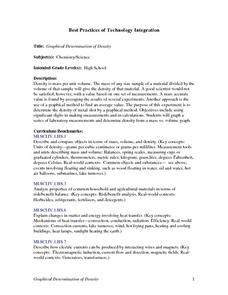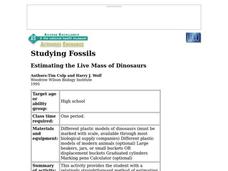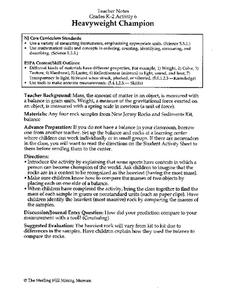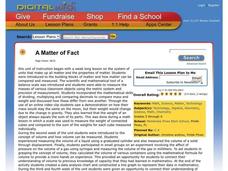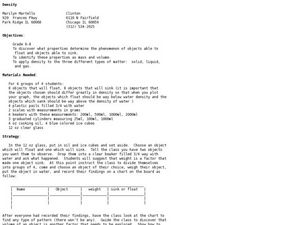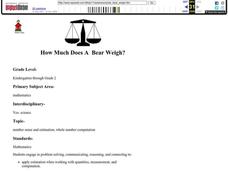Curated OER
Simple Machines IV - Wheels and Axles
Youngsters are introduced to the basic principles and uses of the wheel and the axle. They come up with every day examples of simple machines and look into why the wheel and the axle are best-used as a paired machine instead of used...
NOAA
Mapping the Ocean Floor: Bathymetry
Bathymetry is not a measure of the depths of bathtubs! Through the three lessons, scholars explore two different types of maps and how they are made. The resource focuses on topographic and bathymetric maps and teaching the techniques...
Science Matters
Peanut Energy
How do humans get energy since they aren't mechanical and can't photosynthesize? Learners explore this question by relating potential energy in food to human energy levels. Scholars measure the change in mass and a change in...
Virginia Department of Education
Work and Power
Assist your class with correctly calculating the values for force, work, and power as they determine the amount various activities require. They gather data and participate in a group discussion to compare results upon conclusion of the...
Curated OER
Graphical Determination of Density
Students determine the density of metal shot by a graphical method using significant digits in making measurements and calculations. Students graph a seris of laboratory measurements and determine density from a mass verses volume graph.
Curated OER
Making Sense of Density
Students identify the concepts of density, mass, and volume that define the property of a substance. They also determine that the properties of materials, such as, density and volume, can be compared and measured by using rulers,...
Curated OER
Estimating the Live Mass of Dinosaurs
Students calculate the volume of scale model dinosaurs using a water displacement method. They use formulas to calculate the live mass each of the species of dinosaur. Then they complete and discuss a series of questions.
Curated OER
Aqueduct Architecture: Moving Water to the Masses in Ancient Rome
Ninth graders compare ancient and modern technology in water transporting. In this lesson on the evolution of the aqueduct, 9th graders build a working aqueduct model and examine its components. They explain the importance and use of the...
Curated OER
Vector Lab
Here is a math lab that helps young mathematicians understand the real-life meaning for vector addition. By building a model using spring scales and washers as weight, and then calculating the vector addition using two different methods,...
Curated OER
temperature and the Scientific Method Lesson Plan
Sixth graders study heat, temperature, and heat transfer. Using probeware, the teacher demonstrates boiling points. Students participate in experiments and record the beginning and ending temperatures and mass of objects. After...
Curated OER
Heavyweight Champion
Students identify what mass is and how to measure an object with a balance in gram units. Students identify weight and how to measure with a spring scale in units of force. Students compare the masses of two objects by placing each on...
Foundation for Water & Energy Education
What is the Water Cycle? Activity A
Hydrologists create a concept map about how water is used and a sentence strip defining water and describing its unique properties. Small groups work together to fill a small milk carton and compute the mass of water inside. The next...
Curated OER
A Matter of Fact
Students design their own Science experiment. For this science experiment lesson students create a hypothesis related to matter and test it. They displayed their data in a graph.
Pennsylvania Department of Education
The Weight of Things
Students explore weight. In this math lesson, students predict which item weighs more and discuss how they arrived at their decision. Students weigh several items to determine which weighs more.
Curated OER
Density: Float or Sink
Students discover density. In this density lesson, students discover the properties of objects that allow them to float or sink in water.
Curated OER
Measurement
Students use arithmetic in a practical situation using time and distance.
As the calculations involved in this problem involve single digit addition and multiplication it offers a good opportunity to encourage the students's use of...
Curated OER
A Fashion Extravaganza
Learners decide what body measurements they need to make garments such as a pair of pants. They make a list, and work with a partner to take and record those measurements in centimeters. They discuss the use of centimeters.
Curated OER
How Much Does a Bear Weigh?
Students estimate how many children in their class it would take to equal the mass of one adult bear. They then weigh and record their measurement on a chart to check their estimate.
Alabama Learning Exchange
Inner and Outer Planets
Students explore the solar system. In this planets lesson, students learn about the other planets in the solar system. They watch a video clip from National Geographic on the solar system, compare and contrast the planets and create a...
Curated OER
Automobile-Accident Reconstruction
Students investigate an accident and relate it to math. In this trigonometry lesson, students measure the accident scene, the friction produced, and the speed from the skid marks. They create a poster of their findings.
Curated OER
Forces and Motion
Students are able to analyze gravity as an universal force. They are able to demonstrate ways that simple machines can change force. Students are able to determine how the force of friction retards motion. They are able to describe...
Curated OER
Modifying Viscosity of Egg Yolk
Students investigate the effects of substances on the viscosity of egg yolks. In this viscosity lesson plan, students separate egg yolks from their albumen and then add different masses of albumen back to each egg yolk. They measure the...
Curated OER
Why Cheerios Don't Sink
Students investigate Archimedes' Principle and show how it relates to density. In this Archimedes' Principle lesson plan, students experiment with a beaker of water, a Styrofoam "boat" and a weight. They predict what will happen when the...
Curated OER
Diaper Challenge
Young scholars compare the absorbency of a regular diaper and a swim diaper in fresh water and salt water. In this absorbency lesson plan, students mass the diapers and place them in water and determine the change in mass. They do the...




